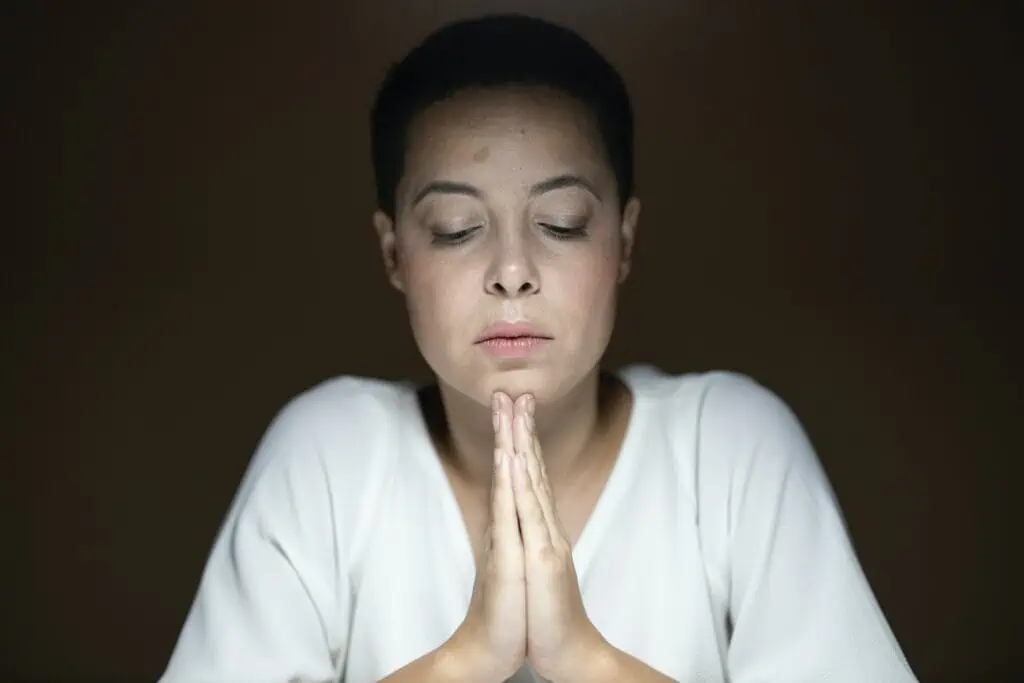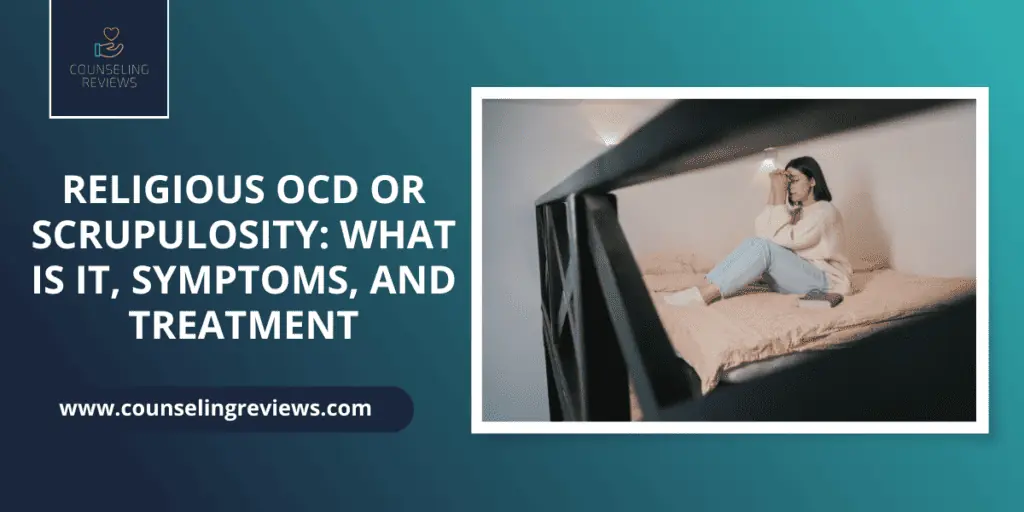Obsessive-compulsive disorder (OCD) is a serious psychiatric condition in which a person suffers from recurring and intrusive thoughts, known as obsessions. The person may engage in repetitive behaviors to reduce or negate the intensity of these intrusive thoughts, known as compulsions.
Usually, most people with OCD suffer from both obsessions and compulsions. However, a minority of individuals may suffer from a purely obsessive disorder. There are different kinds of obsessions, including perfectionism, sexual obsessions, purity and hygiene, contamination-related obsessions, etc.
Some people may also experience obsessive thoughts related to religion. While it is common for people with OCD to utter prayers and chant ritualistically to reduce the distress associated with intrusive thoughts (obsessions), religious OCD or scrupulosity takes on a completely different dimension.
In this article, we look at what religious OCD (also known as scrupulosity) is and how best you can manage it.
What is religious OCD?
Religious OCD is a subtype of OCD that is characterized by an obsession with religious dogma, rituals, and fear of the worst happening. People with religious OCD may engage in compulsive behaviors such as uttering chants, performing rituals, feeling guilty, and severely restricting themselves from everyday activities.
Religious OCD is characterized by several cognitive distortions such as magical thinking, intolerance of uncertainty, over importance of thoughts, and perfectionism. If we look at people with religious OCD closely, magical thinking plays a crucial role in developing this disorder.
Hence, people with religious OCD need to navigate through these cognitive distortions while simultaneously preventing compulsive behaviors from taking place.
Types of religious OCD
Religious OCD is also known as scrupulosity and involves intrusive thoughts regarding morality and religion. As discussed previously, like any other OCD diagnosis, religious OCD has two subtypes.
Purely obsessional obsessive–compulsive disorder
A person with a purely obsessional religious OCD may experience disturbing and intrusive thoughts related to religious dogma and morality. The individual may experience guilt, fear, and anxiety because of imagined moral failures and a sense of failed ethical responsibility. They may be preoccupied with religious beliefs and ideas and dwell on these intrusive thoughts.
However, they will not engage in compulsive behaviors to undo the disturbing nature of obsessions. The Diagnostic and Statistical Manual of Mental Disorders, Fifth Edition (DSM-5) does not recognize this as a valid diagnosis. However, it is common practice among clinicians to use this term (at least unofficially, for the sake of treatment planning) if compulsions cannot be found during case history taking.

Religious OCD with both obsessions and compulsions
Unlike the first subtype, those with this condition not only present with obsessions but also compulsions that aim to reduce the distress associated with the obsessions. Hence, a person with religious OCD may utter prayers, engage in perfectionist behavior, or perform rituals that take up much time and energy.
These compulsions can interfere with interpersonal relationships, occupation, and mental well-being. It is important to note that being religious is not the same as having religious OCD. To meet the criteria for religious OCD, a person should experience significant distress and impairment in social, occupational, and other situations.
Signs that you’re developing religious OCD
There are many signs and symptoms which may help you to determine if you need professional help. If you have been worrying about committing blasphemy, sins, or going to hell because of your actions, think for a while. Are you performing any compulsive behaviors to deal with these obsessions?
You may be visiting your church or place of worship frequently, making confessions often, or praying and practicing rituals excessively. You may also notice that you are hiding your compulsive behaviors from others because you know something is not right in the back of your mind.
If you notice any of these signs, make an appointment with a clinical psychologist or psychiatrist who can conduct a detailed evaluation to arrive at a formal diagnosis. Remember, you should never diagnose yourself with OCD as it is a severe psychiatric illness that requires professional assessment.
Scrupulosity obsessions
Scrupulosity obsessions can take a variety of forms. Some of the most common ones include:
- Having sinned
- Having committed blasphemy
- Not performing rituals correctly
- Repetitive cleansing rituals
- Agreements with a divine power
- Uttering prayers in different sequences
- Hiding your obsessions and compulsions from others
- Going on pilgrimages at the cost of your job or relationships
- Engaging in self-sacrificial behaviors
There could be many other scrupulosity obsessions and compulsions not listed above. If you suspect you suffer from scrupulosity or religious OCD, contact a professional.
How to treat religious OCD?
Religious OCD needs to be treated like any other form of OCD. It requires a combination of psychiatric drugs and psychotherapy. Your psychiatrist may prescribe medicines specifically used for obsessive-compulsive disorder and advise you to attend regular therapy sessions.
Your therapy sessions will focus on preventing compulsive behaviors so that your obsessions lose meaning over some time. The goal of the therapy is to reduce the distress associated with obsessions and compulsions.
Different types of treatments
The first line of treatment for OCD is pharmacotherapy. Your psychiatrist will prescribe a recommended dosage of selective serotonin reuptake inhibitors (SSRIs) to reduce the intensity of the obsessions. However, you may need a higher dosage than necessary for depression.
If SSRIs do not work, your psychiatrist may try antipsychotics and other medicines. It is essential to follow the advice of your psychiatrist. You should never stop taking medication without informing your psychiatrist, who will decide when and how to taper your medicines.
Psychotherapy
The most common form of psychotherapy used to treat religious OCD is Exposure and Response Prevention (ERP) Therapy. In this form of therapy, you are exposed to situations that trigger compulsions and are prevented from performing them.
Slowly, over a period of time, you learn to tolerate the distress and not complete the compulsive behavior. For example, you may be asked to imagine a guilt-inducing situation and urged not to utter prayers.
Your therapist may also try mindfulness, acceptance and commitment therapy (ACT), cognitive behavior therapy (CBT), and other therapeutic modalities alongside ERP.
FAQs
Is scrupulosity OCD treatable?
Scrupulosity OCD or religious OCD is treatable with the help of psychiatric medicines and psychotherapy.
Is religious OCD the same as being religious?
No. Religious OCD interferes with your social and occupational life and causes significant distress to you and your loved ones.
Is religious OCD cultural?
While some cultures focus too much on religious aspects of life, as long as they can remain productive without distress, it cannot be termed OCD.
Religious OCD can be treated.
Religious OCD is a subtype of OCD and may occur as a purely obsessional disorder or a regular OCD with compulsions. It is important to remember that being religious does not mean having religious OCD. You need to experience significant occupational and social distress due to your religiosity to warrant a psychiatric diagnosis.
If you do receive a diagnosis, help is available. A mental health care team consisting of a psychiatrist and clinical psychologist can help treat your religious OCD with medicines and psychotherapy.





